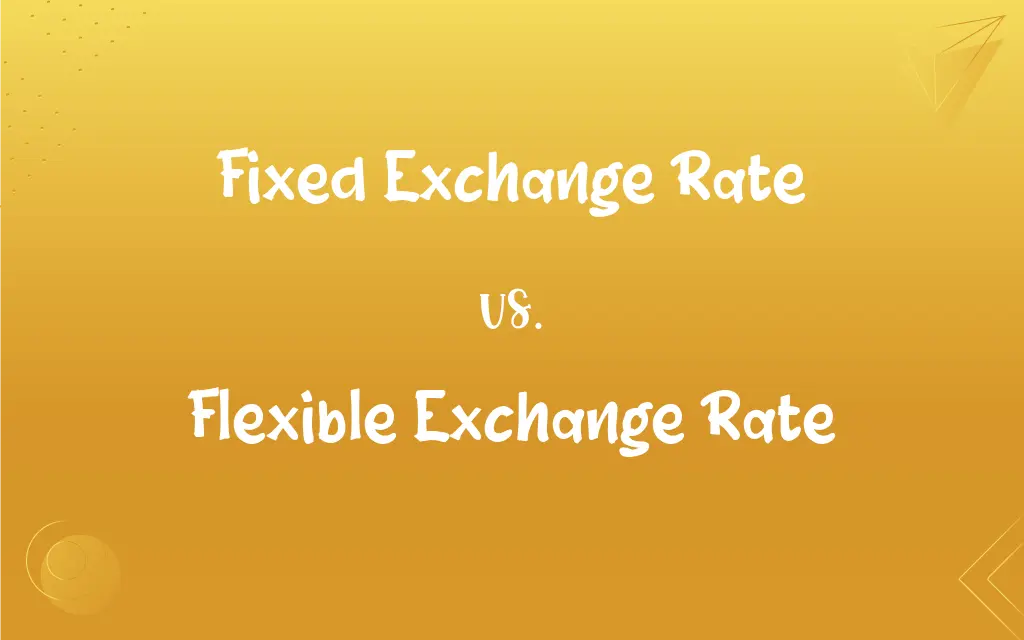Fixed Exchange Rate vs. Flexible Exchange Rate: What's the Difference?
Edited by Aimie Carlson || By Janet White || Published on February 5, 2024
A fixed exchange rate is set and maintained by a government, while a flexible exchange rate is determined by market forces without direct government control.

Key Differences
A fixed exchange rate is set and regulated by a government or central bank, linking its value to another major currency or basket of currencies. In contrast, a flexible exchange rate is determined by the forces of supply and demand in the foreign exchange market.
The fixed exchange rate offers stability, as it remains constant against its pegged currency. The flexible exchange rate, however, can fluctuate daily based on market conditions, leading to potential volatility.
A country with a fixed exchange rate must maintain large reserves of foreign currency to manage its rate and often intervenes in the forex market. A flexible exchange rate system allows governments to focus on domestic policy without having to maintain a specific exchange rate.
Fixed exchange rates can facilitate international trade and investment due to their predictability. Conversely, flexible exchange rates can lead to unpredictability in international transactions but can adjust more naturally to economic conditions.
Fixed exchange rates can make it harder for an economy to adjust to shocks, as the currency value does not change in response to economic changes. Flexible exchange rates can buffer economic shocks by allowing currency values to adjust.
ADVERTISEMENT
Comparison Chart
Determination
Set by government/central bank
Determined by market forces
Stability/Fluctuation
Generally stable
Fluctuates with market conditions
Policy Implications
Requires maintaining currency reserves, market intervention
Less need for intervention, focuses on domestic policies
Impact on Trade
Facilitates predictable international trade
Can lead to unpredictability in trade
Response to Economic Shocks
Less flexible, can struggle with economic shocks
Adjusts to economic changes, provides a buffer
ADVERTISEMENT
Fixed Exchange Rate and Flexible Exchange Rate Definitions
Fixed Exchange Rate
A fixed exchange rate is a currency value set and maintained by a country's government.
The country maintained a fixed exchange rate to stabilize its economy.
Flexible Exchange Rate
It reflects a country's economic fundamentals and market perceptions.
The flexible exchange rate dipped due to negative market sentiments.
Fixed Exchange Rate
It pegs the national currency to another major currency or currencies.
Their fixed exchange rate was pegged to the US dollar.
Flexible Exchange Rate
This rate minimizes government intervention in the forex market.
With a flexible exchange rate, the central bank rarely intervened in currency markets.
Fixed Exchange Rate
A fixed exchange rate aims for currency stability and predictability.
The fixed exchange rate helped in long-term business planning for international companies.
Flexible Exchange Rate
Flexible rates can lead to exchange rate volatility.
Investors were cautious due to the volatility caused by the flexible exchange rate.
Fixed Exchange Rate
This rate requires the government to hold significant foreign exchange reserves.
To maintain the fixed exchange rate, the central bank increased its dollar reserves.
Flexible Exchange Rate
A flexible exchange rate is determined by market forces like supply and demand.
The country's currency value fluctuated daily due to its flexible exchange rate.
Fixed Exchange Rate
Fixed rates often necessitate government intervention in the forex market.
The government intervened frequently to uphold the fixed exchange rate.
Flexible Exchange Rate
It allows currency values to respond to economic changes naturally.
The flexible exchange rate adjusted quickly during the economic crisis.
FAQs
What defines a flexible exchange rate?
It's determined by market forces without direct government control.
How does a fixed exchange rate affect inflation?
It can help stabilize inflation but may not reflect domestic conditions.
Can flexible exchange rates lead to currency crises?
Yes, if market conditions cause rapid and extreme fluctuations.
How do governments manage flexible exchange rates?
Primarily through monetary policy, with minimal forex intervention.
Can a fixed exchange rate be devalued?
Yes, but it requires a deliberate government decision.
Do flexible exchange rates help with economic shocks?
They can, by allowing currency values to adjust naturally.
How do flexible exchange rates impact trade?
They can introduce uncertainty in international pricing.
What is a fixed exchange rate?
It's a currency value set and maintained by the government.
Why do countries adopt fixed exchange rates?
For currency stability and to facilitate international trade.
What advantages do flexible exchange rates offer?
They adjust to economic conditions and reduce the need for foreign reserves.
What's required to maintain a fixed exchange rate?
Large foreign exchange reserves and occasional market intervention.
How does consumer confidence relate to exchange rates?
It can directly impact market forces in a flexible system.
Which system is better for international investors?
Depends on the investor's risk tolerance and objectives.
Is it easier to predict with a fixed exchange rate?
Yes, due to its stability and predictability.
What challenges come with fixed exchange rates?
Maintaining the rate can be costly and complex.
How often do flexible exchange rates change?
They can change frequently, sometimes daily.
Can fixed exchange rates lead to black markets?
Yes, especially if the official rate is seen as unrealistic.
Can fixed exchange rates be beneficial during a crisis?
Yes, they can offer stability in turbulent times.
What role does the IMF play in exchange rates?
It advises and supports countries in exchange rate policies.
Are flexible exchange rates more transparent?
Yes, as they reflect real-time market conditions.
About Author
Written by
Janet WhiteJanet White has been an esteemed writer and blogger for Difference Wiki. Holding a Master's degree in Science and Medical Journalism from the prestigious Boston University, she has consistently demonstrated her expertise and passion for her field. When she's not immersed in her work, Janet relishes her time exercising, delving into a good book, and cherishing moments with friends and family.
Edited by
Aimie CarlsonAimie Carlson, holding a master's degree in English literature, is a fervent English language enthusiast. She lends her writing talents to Difference Wiki, a prominent website that specializes in comparisons, offering readers insightful analyses that both captivate and inform.







































































